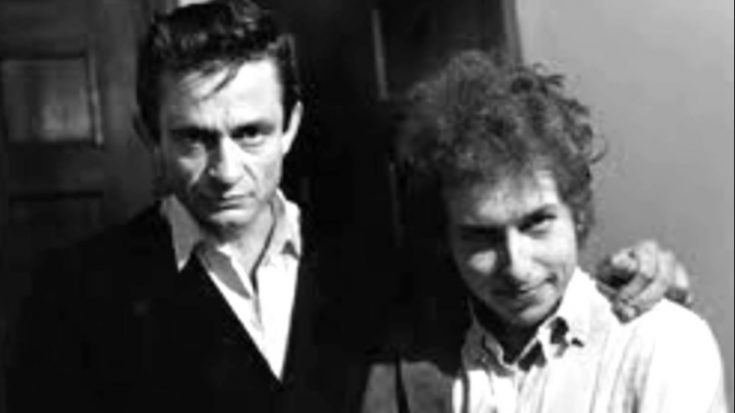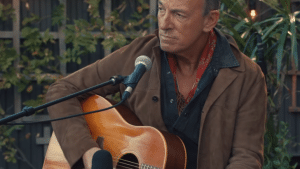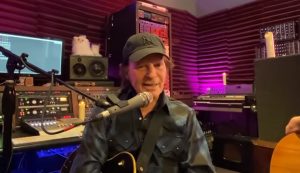11 Country Rock Songs That Were About Murders

Johnny Cash and Bob Dylan - Bob Dylan94 / Youtube
Dust off your boots and saddle up, because we’re about to explore a side of country music you might not have expected. Forget the twangy tunes about pickup trucks and heartbreak – we’re diving into the dark and gritty world of country murder ballads.
This genre isn’t all sunshine and sweet tea. From classic Western shootouts to modern-day domestic dramas, country music has tackled the topic of killing for decades. This list takes a journey through time, exploring iconic murder ballads like Marty Robbins’ “El Paso” alongside contemporary hits like The Chicks’ “Goodbye, Earl”.
11. “Down the River” – Chris Knight (2001)
Chris Knight, a singer-songwriter from Slaughters, Kentucky, tells a chilling tale of revenge in his signature song “Down the River.” The song follows two brothers fishing trotlines at night. A run-in with a local bully on the river foreshadows danger.
As they head back with their catch, a gunshot shatters the peace. The narrator’s brother falls from the boat, presumed drowned by the authorities due to the missing body. But the narrator knows the truth and sets out for his own brand of justice.
10. “Long Black Veil” – Lefty Frizzell (1959)
“Long Black Veil” is a haunting 1959 country ballad penned by Danny Dill and Marijohn Wilkin and recorded by country icon Lefty Frizzell. Sung from the perspective of a man wrongly convicted of murder, the song takes a tragic turn.
Despite his innocence, the man remains silent, refusing to reveal an alibi that would expose an affair with his best friend’s wife. The chorus paints a poignant picture of the woman’s grief, as she visits his grave shrouded in a long black veil, forever marked by the wailing wind and a love kept secret.
9. “Cocaine Blues” – Roy Hogsed (1947)
“Cocaine Blues,” a Western swing song written by Troy Junius Arnall, tells a cautionary tale of addiction and violence. The song follows Willy Lee, who spirals into despair after finding his girlfriend in another man’s arms. Fueled by a toxic mix of whiskey and cocaine, he commits murder and flees across the border to Mexico.
There, he uses music to support his drug habit, but it’s a short-lived escape. Willy is eventually captured and sentenced to a lengthy prison term, serving as a stark reminder of the destructive consequences of drug use. The iconic Johnny Cash famously sang his own version of “Cocaine Blues” at his 1968 Folsom Prison concert.
8. “El Paso” – Marty Robbins (1959)
Marty Robbins’ “El Paso” takes listeners on a tragic journey fueled by love and desperation. In this classic western ballad, a lovesick cowboy falls for a captivating dancer named Feleena at Rosa’s Cantina. Consumed by jealousy, he challenges a rival for her attention in a deadly gunfight. Forced to flee as an outlaw, he finds refuge in the unforgiving badlands.
Though time passes, his love for Feleena remains. Driven by a passion stronger than fear, he returns to El Paso, a place that now holds both his love and his doom. A posse chases him down, leaving him fatally wounded. In a heartbreaking finale, Feleena cradles him as he takes his last breath, sealed with “one little kiss.”
7. “Goodbye Earl” – Dixie Chicks (2000)
“Goodbye Earl,” penned by Dennis Linde, is a dark country song with a surprising twist. Originally recorded by Sons of the Desert, it found massive success when covered by the Dixie Chicks. The story follows high school friends, Wanda and Mary Ann. While Mary Ann escapes their small town, Wanda marries a man named Earl.
However, Earl’s charm quickly fades, revealing a violent and abusive side. When a restraining order fails to protect Wanda, Mary Ann arrives to find her friend injured. In a moment of shared desperation, the women decide to take matters into their own hands, plotting Earl’s demise with a dish of black-eyed peas.
6. “Don’t Take Your Guns to Town” – Johnny Cash (1958)
Johnny Cash’s haunting ballad “Don’t Take Your Guns to Town” tells the tragic story of Billy Joe. A young cowboy yearning for adventure, Billy Joe ignores his mother’s pleas to leave his guns at home. He sets off to a cattle town, eager to prove himself.
Naïve and full of bravado, Billy Joe enters a saloon and attempts to act the part of a seasoned cowboy. But trouble finds him. A local bully goads Billy Joe, and in a moment of anger, Billy Joe reaches for his gun. Unfortunately, the bully is quicker on the draw, fatally shooting Billy Joe before he can even defend himself. The song ends with a somber reminder of the mother’s warnings echoing in the aftermath of the tragedy.
5. “Big Iron” – Marty Robbins (1960)
Marty Robbins’ “Big Iron” is a classic tale of a showdown in the Wild West. The song sets the scene in the dusty town of Agua Fria, where a notorious outlaw named Texas Red terrorizes the locals. With a reputation for killing nineteen men, Texas Red seems unstoppable.
However, when an Arizona Ranger rides into town, the tension escalates. Despite whispers of the Ranger’s potential demise, justice is served swiftly. In the blink of an eye, the Ranger’s “big iron” draws and fires, taking down Texas Red before he can even react.
4. “Papa Loved Mama” – Garth Brooks (1992)
Garth Brooks’ “Papa Loved Mama” explores a heartbreaking story of love, loss, and desperation. The song is narrated by a son reflecting on a tragic childhood event. His father, a hardworking trucker, spent long stretches away from home. This loneliness drove his mother to seek comfort elsewhere, leading to an affair.
One night, the father unexpectedly returns home, unaware of his wife’s betrayal. He discovers the truth at a local motel, and in a moment of despair, crashes his truck directly into the room. The incident leaves the mother dead and the father imprisoned, forever shattering the family.
3. “The Thunder Rolls” – Garth Brooks (1991)
Garth Brooks’ “The Thunder Rolls” emerged as a cornerstone of country music, capturing the hearts of many and becoming an iconic track. This hit song, which was the fourth release from his 1990 album No Fences, is the result of a collaboration between Brooks and the esteemed songwriter from Nashville, Pat Alger.
Despite its popularity, the original release of “The Thunder Rolls” omitted a crucial fourth verse penned by Brooks, which introduced a more somber narrative twist involving a woman seeking retribution against her unfaithful spouse. This verse was excluded to ensure the song’s marketability.
However, Brooks often opts to perform the complete version during live shows, much to the delight of his audience. The song’s accompanying music video sparked debate due to its portrayal of domestic violence, yet it managed to clinch the CMA Video of the Year award and was even nominated for a Grammy.
2. “The Night the Lights Went Out in Georgia” – Starland Vocal Band (1976)
“The Night the Lights Went Out in Georgia” is a haunting Southern Gothic murder ballad written by Bobby Russell in 1972. First recorded by his wife Vicki Lawrence, the song topped the Billboard Hot 100 chart in 1973. Reba McEntire’s later cover reached number 12 on the Hot Country Songs chart, solidifying the song’s place in country music history.
The story is about a man who visits a bar after a trip and learns his wife was cheating. Enraged, he finds his friend dead at home and, in a panic, gets blamed for the murder. A rushed trial sentences him to hanging. The tale takes a dark turn when the narrator, revealed to be the man’s sister, confesses she actually killed both her cheating sister-in-law and her friend, leaving one body undiscovered, highlighting a corrupt justice system that condemns the innocent.
1. “Folsom Prison Blues” – Johnny Cash (1956)
“Folsom Prison Blues” is one of Johnny Cash’s earliest recordings, first released in 1956. However, the live version he performed at Folsom Prison in 1968 became the definitive take. This electrifying performance solidified Cash’s outlaw persona and helped revive his career, with the Live From Folsom Prison album becoming a major hit.
Cash famously wrote the line “I shot a man in Reno just to watch him die” while specifically trying to imagine the most evil reason for murder. Ironically, the line came easily to him after watching a prison movie while serving in the military.






















